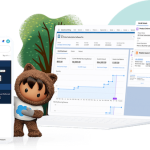The COVID-19 pandemic has catalysed major organisational changes, especially in the ways we work and communicate.
Just think: When was the last time you bumped into a colleague by the watercooler? What about the last time you gave your teammate a literal pat on the back for coming up with a brilliant business idea? Those days seem like a lifetime ago.
The truth is that remote and hybrid work is here to stay. With less opportunities for face-to-face interactions, business leaders are concerned about how the new ways of working will affect business conversations and culture.
How can leaders communicate effectively with teams and maintain business partnerships?
Data drives better conversations
Despite the challenges, many leaders have taken the bull by its horns and transformed business conversations for the better. Unexpectedly, many leaders in the Asia Pacific and Japan (APJ) region reported that changes associated with the pandemic had actually improved business conversations.
These were the findings from a recent YouGov survey commissioned by Tableau with more than 650 business leaders across Singapore, Japan, Australia. We sought to examine how business leaders had adapted decision making and employee engagement strategies since the COVID-19 pandemic began.
Each country had their own unique take. Singaporean leaders noticed a flattening of workplace hierarchies. In Japan, younger leaders adapted better to change than their older counterparts. Australian leaders adopted a more egalitarian approach to leadership.
The positive changes experienced by these leaders all bore a common denominator: the use of data.
In fact, APJ leaders were almost two times more likely than their counterparts elsewhere in the world to use data to improve workplace decision making and communication. By the same token, those who increased their data use were more than twice as likely to report these positive changes, compared to those that hadn’t.
What the transformative power of data looks like
Take Southeast Asia’s latest unicorn, CARRO, for instance. CARRO is an online marketplace where users can buy, sell, or lease pre-owned and new cars. Not only did CARRO keep their car marketplace business afloat, but they even managed to bag new funds in spite of the pandemic.
Credit goes to CARRO’s leaders, who value the ability to curate, explore, and share data with teams across the region. CARRO uses data across all aspects of its business: to level the playing field for employees, remove bias during brainstorms, and improve accountability and transparency during performance reviews.
Meanwhile, at retailer Levi Strauss & Co., data enabled the personalisation of customer journeys and helped the business anticipate market and inventory changes.
Therein lies the transformative power of data. When it is at the centre of all conversations, everyone in the team can come together as equals, and make decisions based on fact and not gut feel.
The importance of leaders in building data cultures
Unlike CARRO or Levi Strauss & Co., not every leader is as tuned in to working with data. Many leaders are still ‘works-in-progress’ as they navigate their way in a data-driven world.
Although many regional leaders recognise that data insights are important and critical in decision-making, they aren’t deliberate and purposeful in weaving data into the fabric of their organisational cultures. There is a strong correlation between leaders who personally use data on a weekly basis at minimum and overall business adoption. Yet, only 16% of these leaders use analytics daily. Worryingly, just 19% of these businesses empower everyone with data. The frequency and scale of data use is not there yet.
This is where data-driven leadership comes in. If employees don’t see their executives making decisions with data, how can we expect the wider business to do the same? At the end of the day, it’s not data that makes the decisions, it’s people who make decisions based on data.
Leaders must push the envelope to drive data adoption across their organisations. They must ask themselves: Am I setting a good example for my team? Have I established a healthy culture where people are comfortable working with data? What can I do to empower my team with the skills they need to succeed?
At Phoon Huat, one of Singapore’s leading food suppliers, data is front and centre across conversations. The leadership team has been deliberate about instilling a digital-first mindset in all their employees. Everyone is equipped with the data skills they need to dig deep into a situation and question findings. This proved pivotal during a time of inflection for the business, when Phoon Huat decided to expand their brick-and-mortar presence online during the pandemic.
Three key steps for creating data cultures
When looking to create a data culture, business leaders need to consider three important areas:
- Make a commitment to lead by example
- Shift mindsets about how people think and behave around data
- Develop skills by hiring and training employees to use data instinctively
What will remain true is that data and quality conversation will continue to be the bedrock upon which successful leadership is built.
Learn more about how business conversations are changing and how business leaders can become more data-driven. Explore the results of the report here.

























